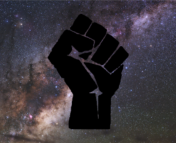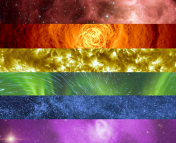Happy Holidays to all our readers!
Astronomy as an academic discipline has grown immensely this past year. What about astronomy as a community? As astrophysicists, we focus on fundamental questions pertaining to the universe, but it is important to be cognizant of the diverse community and its people that work hard to answer those questions. This crucial emphasis on discussing issues affecting our astronomers is why Meredith Rawls, a former Astrobiter, says in her blogpost here, “To successfully land a rover on Mars, we have to invest in the livelihoods of the people who plan and build each part of that mission. To discover new things about the composition of asteroids, we must also examine the composition of our scientific collaborations.”
Inclusive Astronomy, 2015
Dr. Rawls was one of the attendees at the inaugural Inclusive Astronomy, a meeting of astronomers, policy makers, sociologists (and who identify as working in more than one of these fields) in 2015 in Nashville, Tennessee. This meeting was convened to highlights issues affecting astrophysicists who identify as LGBTQIA*, people with disabilities, people of color, and people who consider themselves as under-represented minorities through other axes. To fight racism, sexism, transphobia, ableism and other structural modes of disenfranchisement, this meeting brought together allies and encouraged discussions on the topic of intersectionality. For many of us fall along multiple axes and under many labels, and some or all of those axes that form our identities may make us vulnerable to discrimination.
Inclusive Astronomy was about recognizing issues that the astronomy community faces from structures of oppression and discrimination, as well as offering robust solutions. To make astronomy more inclusive, this group of amazing people chartered a living document, known as the Nashville Recommendations. These recommendations include not only a vision of the field in the future, as well as active steps that physics and astronomy departments all across the USA (and the world) need to take in order to improve the working conditions of disenfranchised astrophysicists!
The Recommendations
The four broad areas that the recommendations, a 40 page document (so far!) touched upon are as follows, as quoted from the Vision Statement for Inclusive Astronomy endorsed by AAS:
1) Removing barriers to educational access, e.g. the use of Graduate Record Exam (GRE) scores in admissions decisions, financial barriers to graduate-school applications, stereotype threat, and accessibility problems that impede the ability of all students to directly participate in learning environments.
2) Creating inclusive climates to improve and maintain diversity, e.g. by eliminating microaggressions, honoring diversity without tokenization, using effective and accessible teaching methods, and effectively mentoring members of historically underrepresented groups.
3) Improving inclusion and access to power, policy, and leadership, e.g. by employing strategies on how to play a role in decisions affecting the astronomical community and learning how people in power can be more inclusive in their decision making.
4) Establishing a community of inclusive practice, e.g. using active rather than passive measures to ensure that astronomers’ groups, events, and institutions are inclusive.
Let us get to work
Do you identify as a physicist/astrophysicist and study/work at a university? Ask your administrator(s) about the steps that your department are actively taking to implement these recommendations. Does your department have a diversity committee, or an equity, diversity and inclusion coordinator? If yes, ask them what you can do to be a good ally and/or contribute to their labour in the community; if not, start one! Let us ensure that we push for efforts that make astronomy a diverse and inclusive community globally.
List of Resources
This is a list of documents and posts for you to read over the holidays, and which inspired this bite:
- The Nashville Recommendations, from Inclusive Astronomy 2015.
- A summary of the recommendations that were endorsed by AAS, posted on Women in Astronomy by Jessica Mink (also check out this awesome blog post highlighting her work on making astronomy more inclusive) .
- A report on the Inclusive Astronomy meeting in Nashville, Tennessee in 2015, written by Meredith Rawls for The Planetary Society (A storified version of tweets compiled by user and attendee csalyk resides here). Astrobites reported on this meeting too!
- Bringing Equity and Inclusion to your workplace, by Kelly Malone at Astrobites.
Featured image taken by Don Pickert/Vanderbilt at the meeting.



Meredith clued me in to intersectionality over a year ago – it applies to our perspective regards all aspects of our social relationships. Do not think yourself powerless to effect social change but such change does start at home.